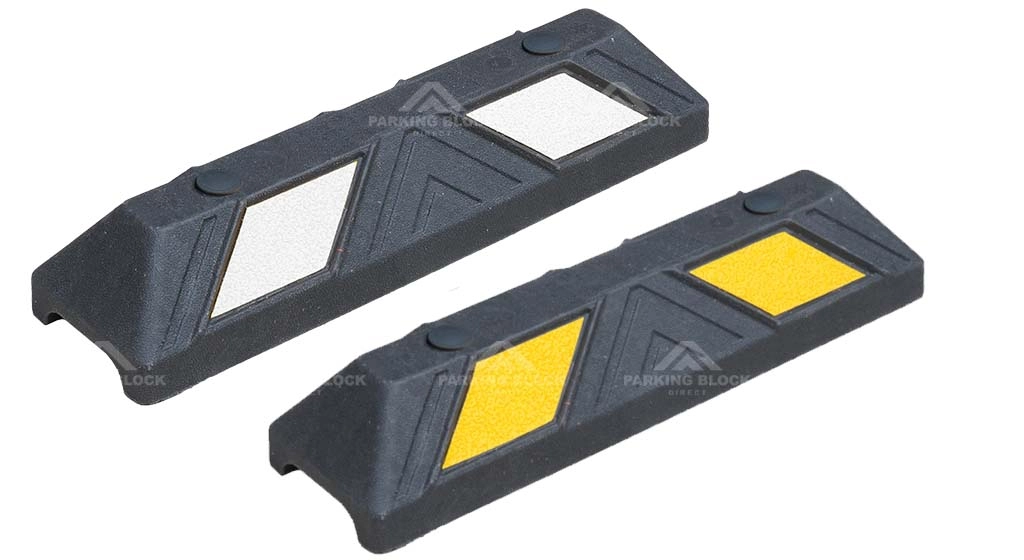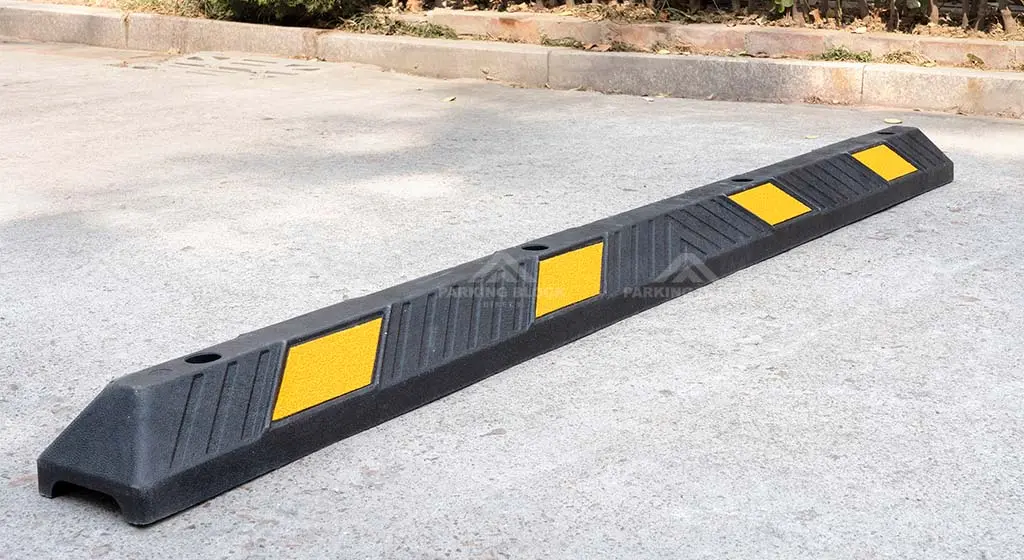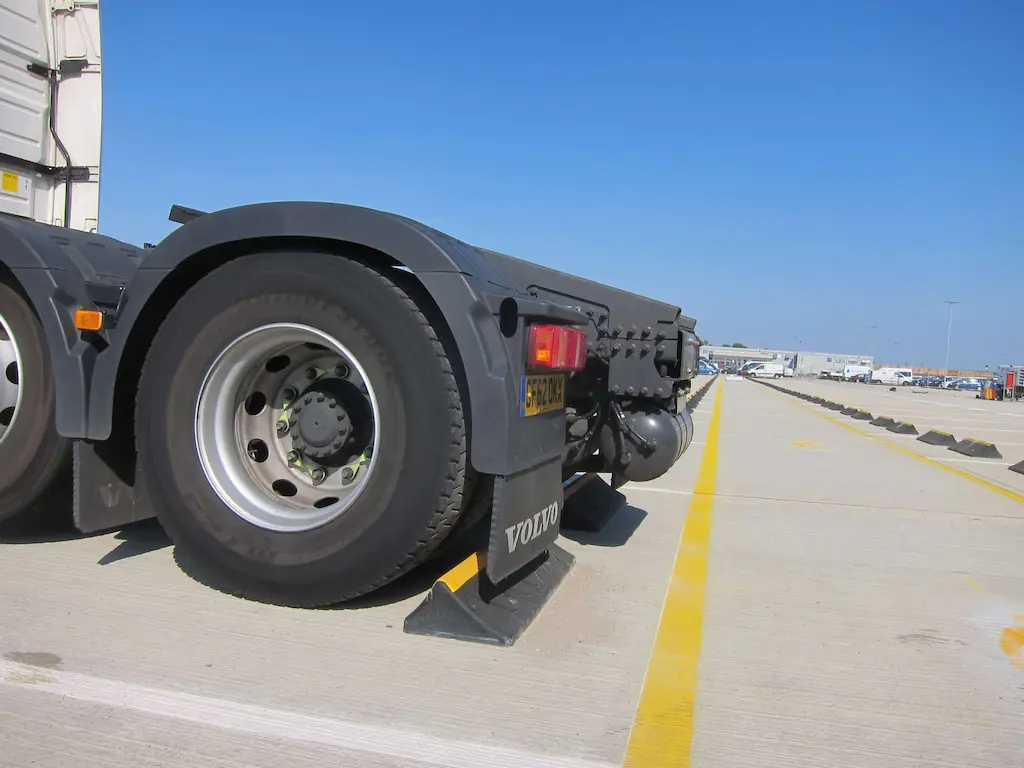What Are the Different Types of Parking Stops?
There are various highlights and materials accessible when choosing wheel stops. However, not all are made equivalent. Many individuals consider it substantial when they ponder wheel stops. However, there are better materials to utilize. Plastic, rubber, and Plastic-Rubber composite materials are substantially more robust and lightweight.
Wheel stops shield the two vehicles and property from harm while cars are being left.
They should be intense, strong, and powerful at halting vehicle wheels. The suitable materials will guarantee they have a long life and will keep on giving legitimate security.
Keep away from property harm and safeguard walkers by adding car stops to parking garages and carports. Accessible in various materials, sizes, and varieties, you can track down the ideal item to address your issues without much of a stretch. Each wheel stop accompanies particular benefits and drawbacks, choosing to depend on your necessities.
For more information, feel free to discover here: Factors to Consider Before Buying a Parking Curb Stop.
Car Parking Stops
Car wheel stops, also known as parking stops, or parking curb stops, are devices used to secure a parked vehicle to prevent it from rolling or moving unexpectedly. They are set before the vehicle’s wheels for solidness and forestall development. Car wheel stops are a fundamental security measure in business and modern settings.
Types:
- Plastic-Rubber Composite Parking Stops
More costly than concrete yet less expensive than rubber, plastic-rubber composite parking stops are adequately adaptable to oblige uneven surfaces without compromising underlying respectability and are easy to introduce. Excellent, flexible finishes won’t break, chip, or blur, promising long periods of reliable use.
Accessible in various sizes, they arrive in multiple colors of reflective films, including yellow and white, to make them visible in dark conditions. Plastic-rubber composite wheel stops are more averse to harming the underside of cars and vehicles, regardless of whether they are run over by a car.
- Rubber Car Stops
It is likewise lighter than cement or steel, making it much simpler to move and introduce. It additionally has the advantage of being exceptionally UV light safe, expanding the parking stop’s life span. Rubber offers strength similar to other stop materials and can be utilized indoors and outdoors.
- Plastic Wheel Stops
They are lightweight and rigid. They are climate safe and simple to clean, settling on them a well-known decision for outside parking garages and carports.
- Concrete wheel stops
These are the most common type of wheel stops made of concrete. They are durable and long-lasting.

Features & Functions
- wheel stop is the obstruction introduced at the parking areas to forestall hazardous vehicle development.
- The fundamental role of wheel stops for vehicles is to act as a sign to the driver that no extra forward drive is permitted.
- They shield the wall or glass from a vehicle striking
- They are situated before vehicles leave obstructions to turn away incidental impacts
- Wheel stoppers act as a limit between the side of the road impediments and vehicles, limiting them from driving past the vehicle stop.
- Yellow or white reflective films are utilized in the wheel stops to upgrade their permeability and make them recognizable for people on foot.
- They are additionally utilized for calculated stopping by flawlessly adjusting in the middle of the space.
- Parking curbs are successfully used to prevent vehicle projections from plunging the exact width of adjacent courses, like walkways.

Advantages of using Car Wheel Stops
Here we will share a portion of the actual uses of Wheel Stops.
Improved safety: Car wheel stops help prevent vehicles from rolling into pedestrians or other vehicles, improving safety in parking lots and garages.
Increased control: Car wheel stops provide a physical barrier to help drivers control the movement of their vehicles and park in designated areas.
Better organization: By clearly marking parking spaces and setting boundaries, car stops help keep parking areas organized and prevent confusion.
Enhanced property protection: They can help prevent damage to buildings, curbs, and other property by limiting the movement of vehicles in a specific area.
Reduced liability: They can help reduce the risk of harm for property owners and managers by helping to ensure that vehicles are parked safely and in designated areas.
Environmentally friendly options: Car wheel stops are made from recycled materials can help reduce waste and support environmental sustainability efforts.

Truck wheel stops
Truck wheel stops, also known as wheel chocks or bus wheel stops, are devices to secure a parked bus and prevent it from rolling or moving unexpectedly. They are typically made of durable materials such as rubber or recycled plastic or Plastic-Rubber composite.
They are placed behind the bus’s wheels to stabilize and prevent movement. Truck wheel stops are an essential safety measure, especially in commercial and industrial settings, where many trucks or buses are parked for extended periods.
As car wheel stops, several types of bus wheel stops are available, including rubber, plastic, Plastic-Rubber composite, concrete, and steel…
The advantages of truck wheel stops are similar to those of car wheel stops, including improved safety, compliance with regulations, convenience, durability, versatility, and cost-effectiveness.
Types:
There are a few sorts of truck wheel stops accessible, including:
- Plastic-Rubber Composite Wheel Stops: They are sturdy and have a bit of elasticity intended to assimilate shock and oppose enduring. They are more lightweight than rubber and straightforward to deal with, pursuing them a well-known decision for vehicle proprietors.
- Plastic Wheel Stops: They are lightweight and rigid. They are climate safe and simple to clean, settling on them a well-known decision for outside parking garages and carports.
- Rubber Wheel Stops: They are the toughest and great for high-traffic regions. They are weighty and hard to move, making them a decent decision for long-lasting establishments.
- Steel Wheel Stops: They are hardcore and intended to endure weighty loads and effects. They are great for business and modern applications and are often utilized in regions with heavy traffic.

In addition to these types, wheel stops can be moved to accommodate different wheel sizes and vehicle types, making them a versatile option for many applications.
Regardless of the type of truck wheel stop, they are all designed to provide stability and prevent the movement of parked trucks and trailers, ensuring the safety of drivers, passengers, and pedestrians in the surrounding area.
The advantages of truck wheel stops
The advantages of truck wheel stops are similar to those of car wheel stops, including improved safety, compliance with regulations, convenience, durability, versatility, and cost-effectiveness.
Safety: It helps to prevent accidents by keeping parked vehicles in place, reducing the risk of collision with other cars, pedestrians, or property.
Compliance: In many areas, the use of truck wheel stops is required by law, ensuring compliance with local regulations and reducing the risk of fines and legal penalties.
Convenience: They are easy to install and use, making it simple for truck owners and operators to secure their vehicles.
Durability: Many are made of durable materials such as rubber, plastic, Plastic-Rubber composite, concrete, or steel, which can withstand heavy loads, impact, and weathering, ensuring long-lasting performance.
Cost-Effective: They are a cost-effective solution for securing parked vehicles, and they can also help reduce maintenance costs by preventing damage to other cars, buildings, or surrounding property.

Conclusion
Parking blocks are used to secure vehicles and prevent them from rolling or moving. They are commonly used in parking lots, garages, and other areas where vehicles need to be parked temporarily.
Regarding final thoughts, it’s essential to consider the following when using wheel stops:
Placement: Ensure the wheel stops are placed correctly to provide maximum effectiveness and ensure the vehicle’s and its passengers’ safety.
Material: Wheel stops come in various materials, including concrete, rubber, Plastic-Rubber composite, and plastic. Consider the environment and use of the area to determine the best material.
Size: Make sure the wheel stop is the right size for the type of vehicle you are parking.
Maintenance: Regularly inspect and maintain wheel stops to ensure they are in good condition and can provide the necessary support.
It’s essential to choose and use them correctly for maximum effectiveness.
FEEL FREE TO CONTACT US
OUR FACTORY
Parking Block Direct is a well-known wheel stop manufacturing company located in Qingdao.
Since 2013, we have produced and distributed premium-quality products across different countries to help people improve vehicular and pedestrian safety in public parking lots and garages.
OUR WORLDWIDE DELIVERY
We ship our products in reliable packing worldwide. We ensure our products are delivered to your doorstep in the best possible condition for your public parking garage.
No matter where you live, contact us and learn about the shipping process, delivery date, or any other questions.
For further information, feel free to check the following pages:
hello@parkingblockdirect.com
